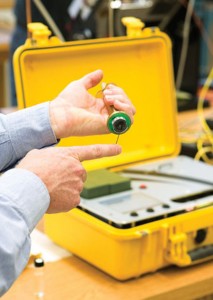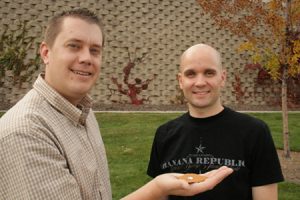
Chemistry professor Milton Lee designed this portable device to help the military detect chemical and biological attacks Torion Technologies has licensed the instrument and is marketing it for a variety of other uses as well.
Two decades ago Dee G. Anderson (BS ’79) licensed two technologies: one from BYU and one from Cornell. Combining them, his company created a product no one thought possible and landed itself on the covers of industry magazines. Now Anderson works for BYU, seeking to license a panoply of BYU technology to budding entrepreneurs and established businesses.
“We want to raise awareness about BYU technology and give more people the opportunity to take advantage of it,” says Anderson, associate director of the BYU Technology Transfer Office. For 14 years BYU has been ranked first in the nation for start-up companies per million dollars of research.
A primary role of the office is to be a matchmaker. “Our aim is to understand a potential user and present the BYU technology that would benefit both them as well as the university,” Anderson says.
G. Michael Alder, director of tech transfer at BYU, says BYU’s office is different than that of most universities because of the real-world experience of its staff. “Our licensing professionals all have serial successful entrepreneurial experiences with more than 20 start-up companies between three licensing professionals. We understand what it takes to create a successful venture.”
BYU licenses a diverse portfolio of technology to a variety of corporations, including those listed here.
Repelling Water
Chris E. Bryant (BS ’00), CEO of Xeromax Sciences, and Jonathan Ward (MBA ’09), the COO, are marketing a water-repellant technology for apparel and textiles. “What is unique about the coating is it does not change the material it’s applied to and [it] is environmentally friendly,” says Bryant. The technology was developed by associate chemistry professor Matthew R. Linford (BS ’90) and grad student Gaurav Saini (’09).

Entrepreneurs Chris Bryant (left) and Jonathan Ward have licensed a BYU water-repellant technology for athletic apparel.
Portable Chemical Analysis
Using the work of chemistry professor Milton L. Lee, Torion Technologies produces portable instruments for chemical analysis. “Rather than taking samples and coming back to a laboratory, users can perform analysis while in the field,” says Torion president Douglas W. Later (BA ’78). The instrument has a range of uses, including on-site testing for soil and water contamination or sampling jungle flowers to find new fragrances.
A Kinder, Gentler Dental Drill
Entrepreneur Tim D. Nelson’s company, WaterJet International, has licensed water dental drill technology based on work done by mechanical engineering professor Robert H. Todd and former student Scott C. Hansen (BS ’98). “My wife is a dental hygienist, and I own a dental staffing company—this was a perfect fit,” Nelson says. “The drill uses water to do the cutting, thus reducing the noise, pain, heat, and vibration of conventional drills.” A prototype is being used by dentists.
“There are so many different kinds of technologies invented at BYU; some are enterprise worthy and well suited for a start-up, and others are best suited for corporations that want to fill new inventions into an existing product line,” says Anderson. “We want to invite successful serial entrepreneurs, alumni, and others to help us evaluate BYU inventions and find a home for them.”
Info: To learn more about available BYU technologies, connect with Dee Anderson on LinkedIn or at dee_anderson@byu.edu or contact Mike Alder at malder@byu.edu.






